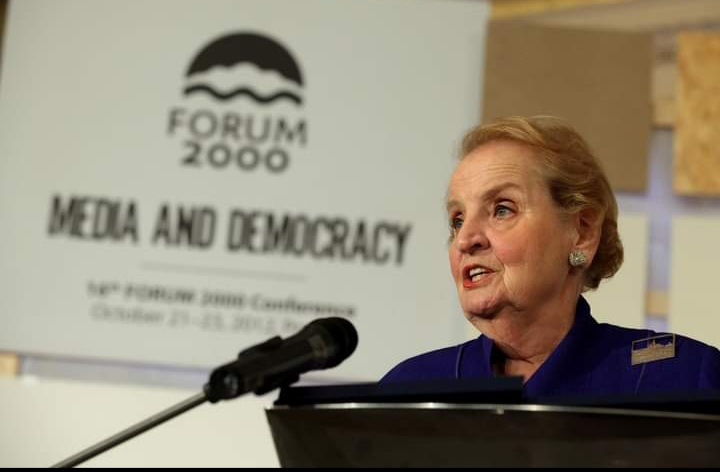Photo: Madeleine Albright/Facebook
Madeleine Albright, the first female secretary of state in the history of the United States, has died.
Her death was announced by her family in a post on Madeleine’s Twitter handle on Wednesday.
“We are heartbroken to announce that Dr. Madeleine K. Albright, the 64th U.S. Secretary of State and the first woman to hold that position, passed away earlier today,” the post reads.
“The cause was cancer. She was surrounded by family and friends. We have lost a loving mother, grandmother, sister, aunt, and friend.”
Advertisement
Below is a statement from the family of @Madeleine: pic.twitter.com/C7Xt0EN5c9
— Madeleine Albright (@madeleine) March 23, 2022
Advertisement
Speaking on the development, Ned Price, spokesperson of the US department of state, said Madeleine’s impact on the country is significant.
“The impact that she has had on this building is felt every single day,” he said.
“She was a trailblazer as the first female secretary of state, and quite literally opened doors for a large element of our workforce.”
Albright, who was a Czech immigrant, became America’s top diplomat in 1997 during the tenure of Bill Clinton, former US president.
Advertisement
She was initially born with the name Marie Jana Korbelova in Prague in 1937, but became a US citizen in 1957 after her family moved to the United States in 1948, seeking political asylum.
On her Twitter bio, Madeleine, an author, is described as a “refugee, prof, bizwoman, pin collector & occasional drummer”.
Before her death, Madeleine was praised for efforts to promote democracy, and is said to have been at the forefront of ending ethnic cleansing in Kosovo, a country in south-east Europe.
Speaking in an interview with PBS on the US’ efforts to address the situation in Kosovo — a war arising from conflict between ethnic Albanians and ethnic Serbs and the government of Yugoslavia in Kosovo — Madeleine said she was concerned about the massacre and knew that something had to be done.
Advertisement
“I had been very concerned about Kosovo for some time. The whole Balkan crisis began in 1989, when Milosevic basically took away Kosovo’s autonomy. We had been working all along to try for a political resolution to the issue. But things clearly deteriorated in the beginning of 1998,” she was quoted as saying.
“We were very concerned about that massacre. In a subsequent contact group meeting, I said firmly that we learned a lot of lessons in Bosnia, where we waited too long to do something–that, as foreign ministers, we would be judged very harshly if we allowed something like this to happen again.”
Advertisement
Add a comment






